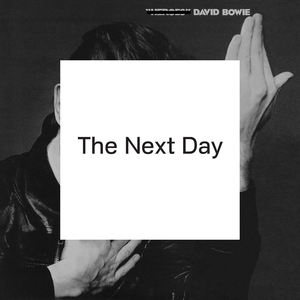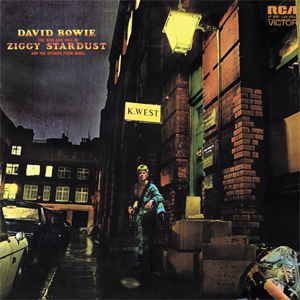It's been over three years since my last post on this blog. This is partially the fault of my on-again, off-again relationship with social media. Another reason is the birth of Ramona and the work of being a new parent. To say a lot has happened is a bit of an understatement. I regret not being able to blog about music, especially in the context of 2016, a year in which we lost so many people.
Losing Lemmy Kilmister in December 2015 was like a prequel. I watched the live streaming of his funeral (something I would never ordinarily do) because he was a fascinating, complex person, and just about everything he did was over the top in some extraordinary way, including his death. Losing a musician is like losing a member of the family, especially if you've grown up with that person's art around you.
When Bowie's "The Next Day" came out back in 2013, I didn't pay much attention until Henry Rollins mentioned how great it was in an amusing article that was mostly about how shitty music has become. I picked it up and, after listening to it, my heart dropped. Something was seriously dark about the tone, and I knew something really wrong was going on with Bowie.
The cover should have been a dead giveaway. Not only is '"Heroes"' in strikethrough (something he did with other albums, such as "Heathen"), but he gives us the entire album '"Heroes"' with a big white square over his face. It tells us he is not just reflecting on the past, but the next day is upon us, and maybe things aren't going to go in the direction we'd like them to go (more on '"Heroes"' later). Songs such as "Valentine's Day" and "I'd Rather Be High" are deeply political and topically relevant, but when I heard "If You Can See Me," I knew there was some clever wordplay going on...is he going to meet a lover, or his oncologist? Maybe a bit of both. Everything he did, as it turns out, had so many more layers to it, even when we were already looking at layers.
Like probably most people, I found much of Bowie's work to be hit-or-miss. Amy obsessed over "The Rise and Fall of Ziggy Stardust and the Spiders from Mars," but to me it was a bit all over the place (I love "Lady Stardust" but I still can't understand what "Suffragette City" is really supposed to be all about). Still, "Ziggy" is probably Bowie's most familiar and essential. It was also the first Bowie vinyl I looked for, oddly rare and also stood up to multiple listens.
It was Rachel that really introduced me to "Low," almost categorically opposite to all things I knew about Bowie. After a few listens, I realized that maybe Bowie was a musical genius masquerading way too much as a pop star (no make-up here, just long, brooding notes). "Low" is that dystopian future only hinted at in "Five Years" in Ziggy. The distance between Frank Zappa and David Bowie, musically, was nowhere near as great as I would have thought ("Fuck you, Captain Tom!" Zappa famously shouted at Bowie for poaching drummer Aynsley Dunbar from him in the early 70's).
Of course, "Low" was a collaboration with Brian Eno, like the follow-up albums '"Heroes'" and "Lodger."
'"Heroes"' was the inspiration for this post. Shortly after Bowie's death, his albums on vinyl became even more scarce. It wasn't until last month that '"Heroes"' was reissued, more than two years after his death. I had been looking for it for a while, but gave up. When I found out about the reissue, I pounced on it as soon as I could.
It was well worth the wait. Think you know the song '"Heroes"'? You don't. Like so many people, I was well familiar with the 3+ minute single version of the song. I didn't really get the whole bit about dolphins swimming or why Bowie suddenly gets emotional and shouting (sounding cheesy). A catchy tune, probably familiar to most folks. One of his most familiar songs of all time.
The album version of '"Heroes"' is entirely different. At over 6 minutes, it opens with "I, I will be king / And you, you will be queen / Though nothing will drive them away / We can beat them / Just for one day." The entire context for the song is completely missing in the single version. And it gets deeper. "And you, you can be mean / And I, I'll drink all the time / 'Cause we're lovers, and that is a fact / Yes we're lovers / And that is that." The long build-up to the emotional part with Bowie shouting is like a gut-punch. This is a song about two star-crossed lovers on opposite sides of the Berlin Wall, finding a short refuge in each other's arms. It's a tale about what walls do not just to lovers, but to families. An all-too-familiar message, as relevant today as it was back in 1977.
Let's not make light of the fact that the song (and album) are called '"Heroes"' and not "Heroes" (the scare quotes are intentional, and yes, used correctly. The rest of the album is musically brilliant, filled with the same energy and minimalism of "Low." The Eno-effect on Bowie was transcendent.
When Bowie passed in 2016, he gave us "Blackstar" as a parting gift. The five stars on the bottom spell out either "David" or "Bowie," depending on how you look. There probably isn't any way to critique it, except to say it carries some of the same warning messages as "The Next Day." The only black stars in the universe pull everything towards them and eliminate all of existence, only to transmit everything out as information in the form of gamma rays. If someone were to tell me that Bowie was really an angel, and that his death was a message that we all had only five years left on earth, it would be a hard thing to counter.


.jpg)

.png)
That information leaking out of black holes is called "Hawking radiation." Just this week we lost Stephen Hawking as well.
ReplyDelete